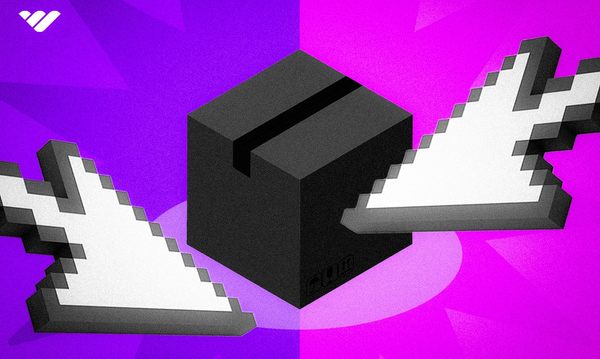Etsy, an ecommerce company selling vintage and handmade items in various categories, has sold more than 100+ million products since its inception. With 96+ million active buyers, it remains one of the largest global marketplace places available. In fact, in 2023 alone, Etsy sold about $13.16 billion worth of items to its active sellers of about 9 million.
However, while it's one of the best places to sell products, selling your vintage items elsewhere may be better (and more financially rewarding).
In this guide we take a look at why you may want to sell your crafts on an Etsy alternative, and list the best places you can sell handmade goods online.
Is Etsy the Right Choice for You?
There are a few key reasons why sellers may choose to look beyond Etsy: fees, competition, and branding.
Multiple Compulsory Fees
Etsy sellers have a lot of different fees to consider when selling on the platform.
The first is a $15 one-time fee to set up their stores. Then, a $0.20 listing fee for each item you want to list. A renewal fee every four months also applies for each listing. When a buyer purchases an item from your store, Etsy also charges 6.5% of the listing price. Then, there's payment processing fees.
These are just the compulsory Etsy fees. On top of this you have location-based fees and optional fees for features like advertising and private listings.
A Crowded Marketplace
As a seller, being on an active marketplace is usually a good thing. But, with almost 10 million active sellers on Etsy, it can be hard to stand out from the crowd. As a result, the chances of selling multiple items is significantly lower.
Unless you're already an established brand, signing up for another platform to sell various items and generate more revenue might be more beneficial for you.
Limited Branding Control
With Etsy, Sellers don't have complete freedom on how their store functions and looks. You can change the shop description and the banner, but can't fully customize your store. So, if you want to grow your brand, looking for an alternative might be better.
10 Etsy Alternatives for All Types of Creators
Etsy not the right choice for you? Here are ten alternative platforms for selling your goods online.
1. 🏆Whop: Best for Digital Products and Services
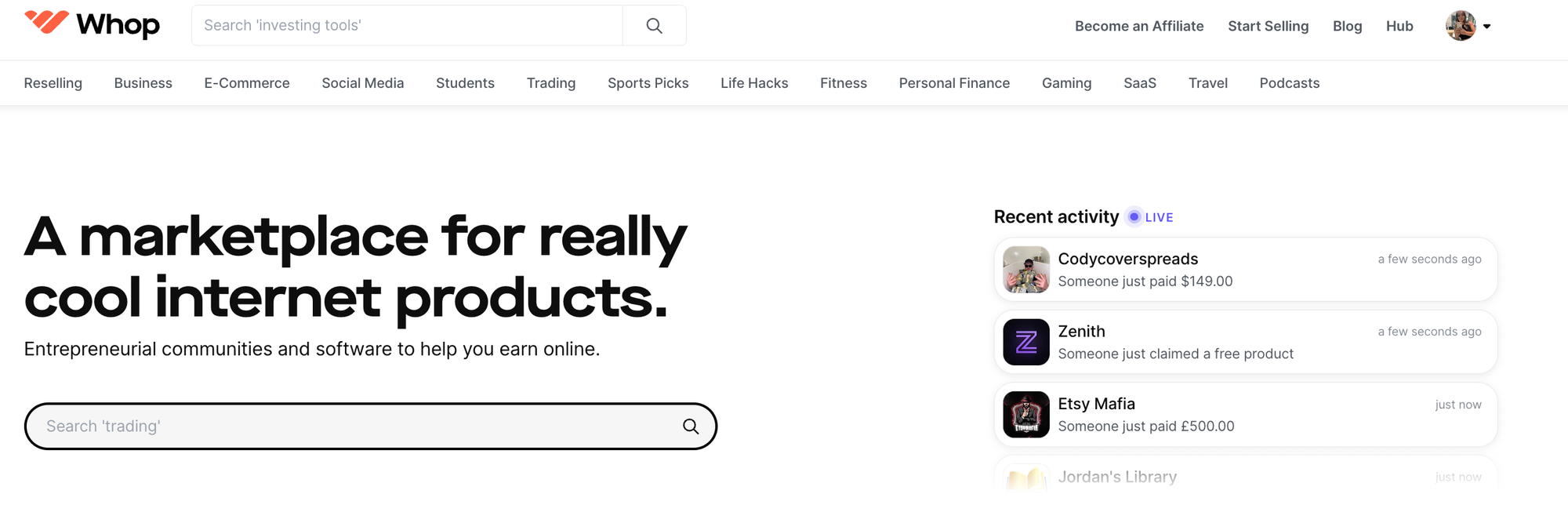
Whop is a social commerce platform allowing sellers to sell various digital products and services. From sports picks to software, online courses to ebooks, you can sell anything on Whop. So if you're using Etsy to sell handmade digital downloads like Canva templates, printable art, digital planners, workbooks and coloring sheets, you can sell all of these (and more) on Whop instead. You could even create your own paid online community centred around your products, directly on Whop.
Pricing: Signing up with Whop is free - unlike Etsy, there are no setup fees. Then, there's just a 3% fee on the sales you make. *If you want to list on the marketplace, this comes with additional fees.
2. Shopify: Best for Physical Goods

Shopify is one of the most well-known ecommerce store builders, and it provides various tools and resources for its sellers. As a user-friendly platform, you can easily customize your store and use your own domain for building your brand to the point where you would not even know that it was a Shopify store. Those with an Etsy store already set up can use the integration app to easily connect with Etsy.
Pricing:
Shopify offers four different plans to sellers:
Basic - $19 per month
You get basic services including 10 inventory locations and up to three markets. Card rates start at 2% for third-party providers.
Shopify - $49 per month
Includes everything from the basic package plus 5 additional staff accounts. Card rates are at 1% only.
Advanced - $299 per month on a 3-year term
Card rates are at 0.6%, and include 15 additional staff accounts and 10x checkout capacity.
Plus - $2,300 per month
Includes additional features, such as 200 inventory locations, 50 markets, unlimited staff and fully customizable checkout capacity.
3. Amazon: Best for FBA
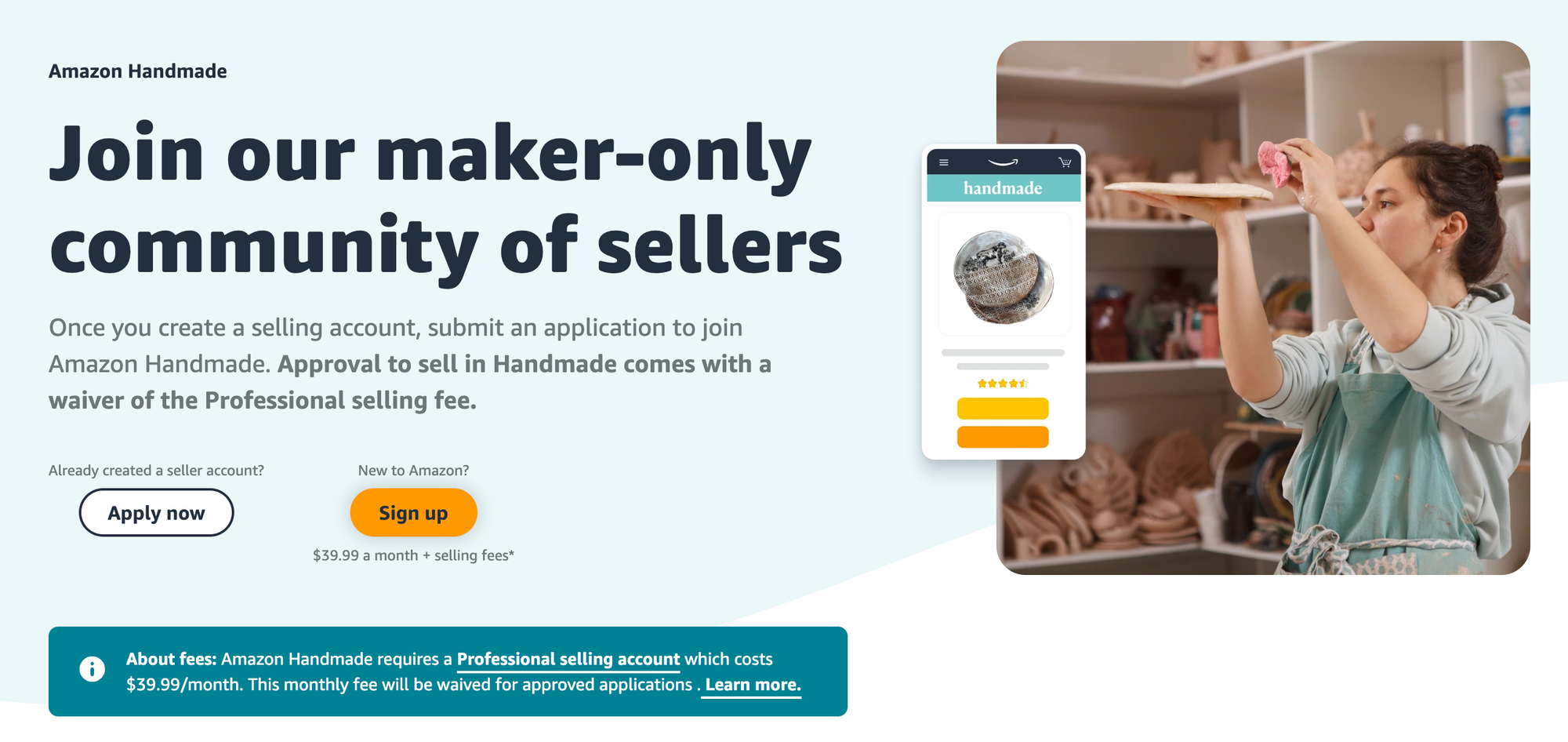
Amazon may not be the first thing that comes to mind when you consider selling crafted goods, but it does have a market for handmade crafts through Amazon Handmade. The best part? You can use Amazon FBA. With FBA, you store your products in one of Amazon's fulfillment centers, and they pick, pack, ship, and provide customer service for your products.
Pricing:
Amazon Handmade's Professional selling plan is at $39.99 per month. There are also fees for FBA and these are tiered based on the size and weight of your products.
4. Big Cartel: Best for Small Operations

Looking for something simple and maintenance? Use your own custom domain to sell your art online. With Big Cartel, you can set up their own store for free or pay a monthly fee to enjoy additional services such as shipment and inventory tracking plus ads support.
Pricing:
Big Cartel offers three plans for its sellers:
Gold-free forever
Sell up to five products and upload one image each per listing. You can SEO-optimize your templates for free.
Platinum - $15 per month
Sell up to 50 products with 5 images per listing. Additional services include shipment tracking, inventory tracking and bulk editing.
Diamond - $30 per month:
Sell up to 500 products and upload 25 images per listing. Additional services include prioritized support, bulk editing, Google and FB ads, and shipment and inventory tracking.
5. IndieMade: Best for Artists
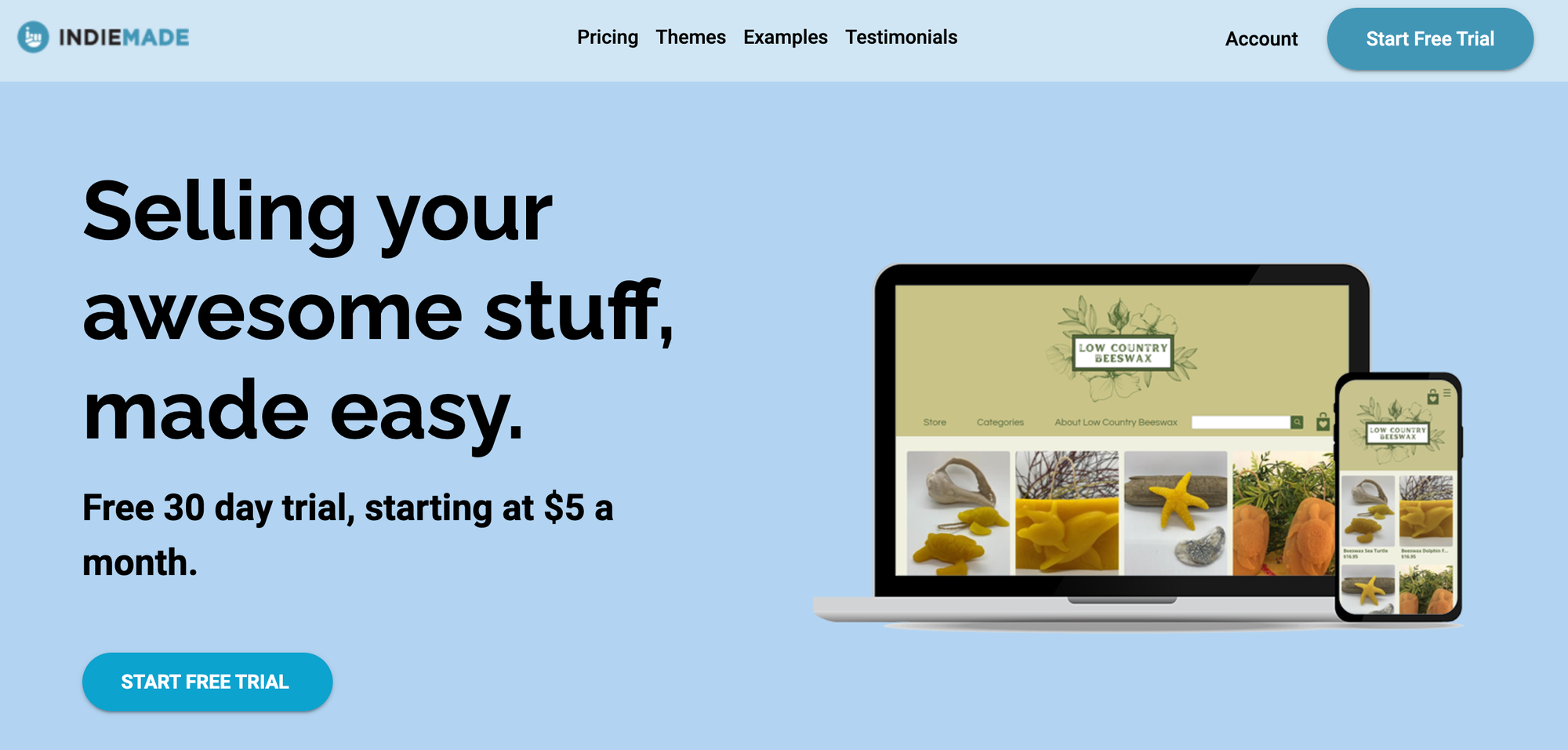
Ideal for selling hand-made goods, Indiemade is best for independent artists who want a simple, affordable, independent ecommerce site. Unlike Etsy, you can customize your website to your brand. If you already have an Etsy store, you can sync your listings and sales with Indiemade. You can also host a blog on your IndieMade site.
Pricing:
Basic - $4.95 per month
Inclusions: 10 products, 10 pages, 10 galleries and 5 images per product
Standard - $12.95
Inclusions: 250 products, unlimited pages, unlimited galleries and 10 images per product
Pro - $14.95
Inclusions: 500 products, unlimited pages, unlimited galleries and 20 images per product
Plus - $19.95
Inclusions: unlimited products, unlimited pages, unlimited galleries and unlimited images per product
6- Squarespace: Best for No-Code Online Stores

Squarespace offers drag-and-drop tools to help sellers customize their stores, allowing you to pick designer fonts, templates and color palettes to set up your store. With Squarespace you can sell products and services, easily set up client appointments and send invoices. You can also import your entire Etsy site to Squarespace.
Pricing:
Personal - $16 per month
Includes a custom domain and the ability to send invoices and take appointments.
Business - $23 per month
Includes everything from the Personal plan plus advanced website Analytics. The transaction fee is only 3%.
Basic Commerce - $28 per month
Includes advanced marketing tools to help you sell and no charges for transaction fees on the sale of products or services.
Advanced Commerce - $52 per month
You can sell subscriptions for this plan. Additional features include advanced shipping and discounting.
7. eBay: Best for Resellers
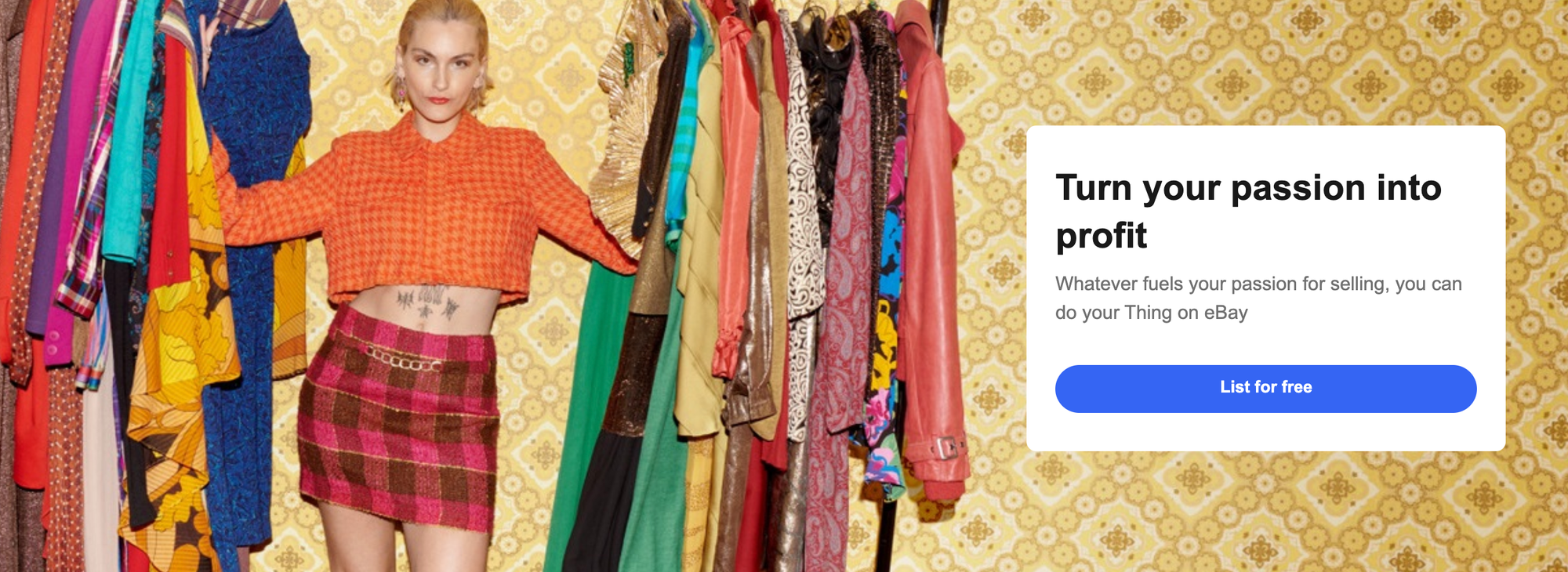
Founded in 1995, eBay is known as an auction store. You can resell anything, including handmade goods, on eBay. Listing a product or service is free; you only pay a transaction fee when the item sells. So, if you sell vintage items on Etsy, you could try selling them on eBay instead.
Pricing:
Get a store subscription if you plan to sell multiple items on eBay.
Starter Store - $4.95 per month
Auction listings are free and the insertion fee for additional listings is 30¢.
Basic Store - $21.95 per month
Includes free fixed-price and free auction listings with a 25¢ insertion fee for additional listings.
Premium Store - $59.95 per month
The insertion fee for fixed-price listings is 10¢ and 15¢ for free auction listings.
Anchor Store - $299.95 per month
Offers a 5¢ insertion fee for fixed-price listings and a 10¢ insertion fee for free auction listings.
8. RedBubble: Best for Print on Demand

If you're an artist selling designs on Etsy, you could sell physical pieces on RedBubble instead. With Redbubble, artists can sell their art which can be printed on different products, such as shirts, bags, notebooks or mugs. Sellers upload their designs and RedBubble prints the design on the item and ships it to the customer - this is known as print on demand. So, you craft your designs and RedBubble transforms your art into physical goods for you.
Pricing:
Redbubble Standard - An account fee applies
You get to set your own price and receive around-the-clock support. You can also ship around the world.
Redbubble Premium
You get all features from the Standard plus email newsletters with tips and insights. There are also no account fees.
Redbubble Pro - For sellers in the top-seller program
You get more marketing strategies and advanced customer and marketplace insights. The fees are based on the artist's monthly earnings. There are no fees if you don't make a sale.
9. Mercari: Best for Reselling Clothes
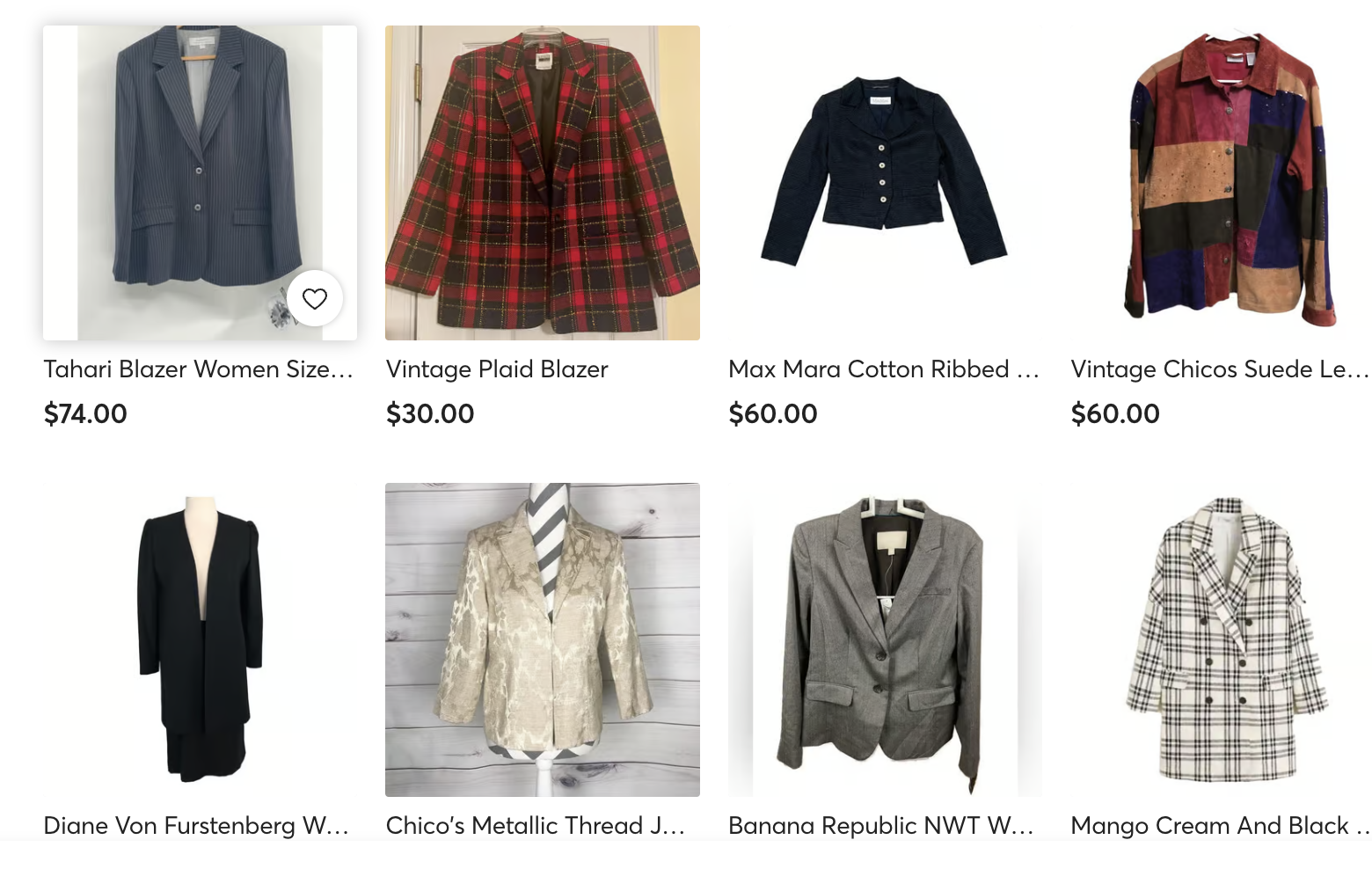
Mercari allows you to sell anything, including new and used items and handmade goods. Absolutely 0% fee when listing products at Mercari - you only get charged when your item sells. It's ideal for reselling clothes but you can also sell other stuff at Mercari. You'll find various items sold on the marketplace, which include toys, beauty products, handbags, electronics, shoes and gadgets.
Pricing:
While it's free to list products on Mercari, you do pay a 10% seller fee when you make a sale.
10. Storenvy: Best for Independent Artists
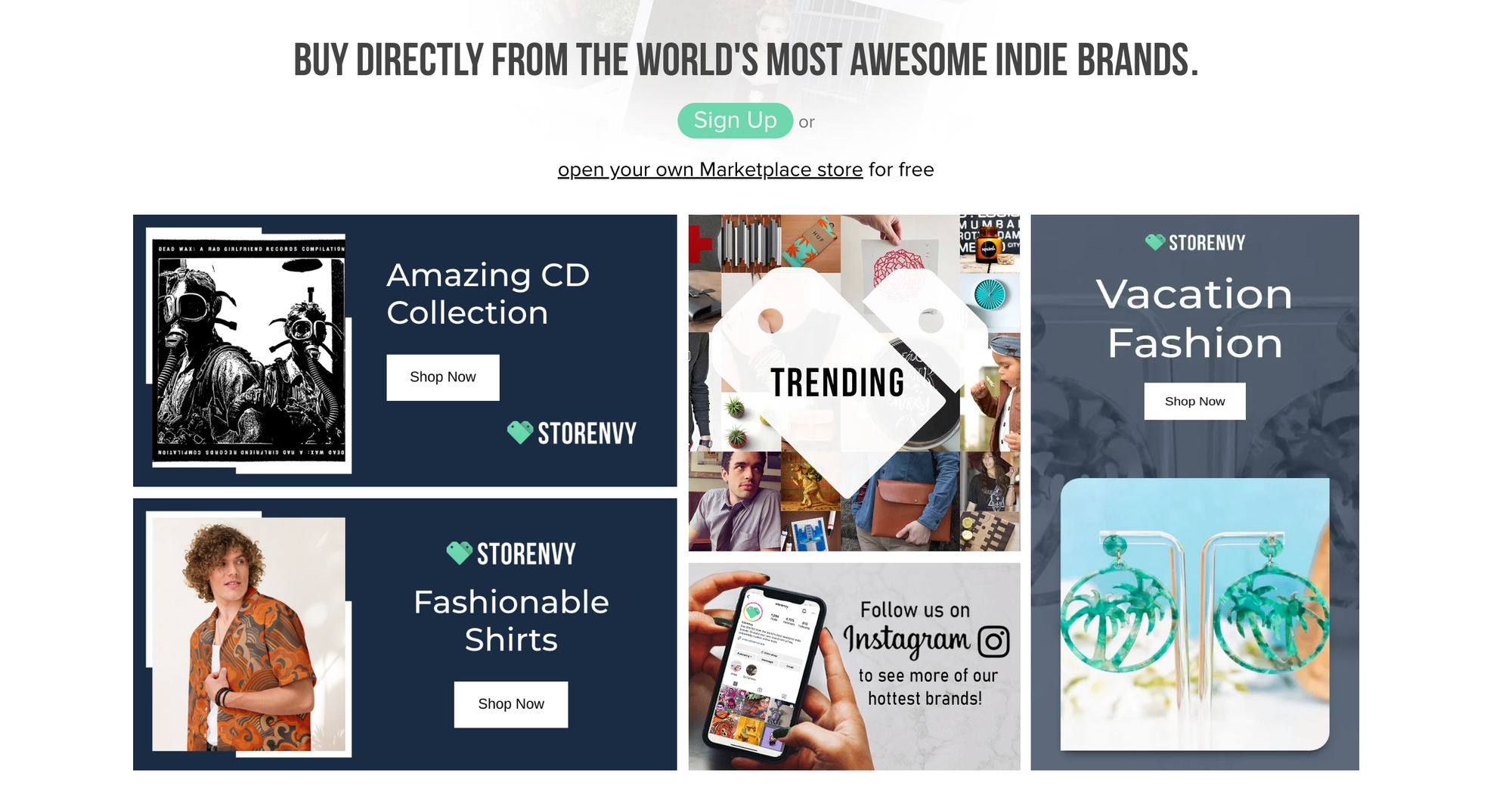
Ideal for indie artists, you can sell your products in two ways: by building a customized online store and through Storenvy's Social Marketplace. User-friendly and free, you don't need advanced technical skills to set up your store. If you prefer to test the waters, you can always sign up for the free plan first and sell up to 20 products.
Upload your products and attract Watchers who are notified when you add new products to the social marketplace. You can get more exposure by getting more Envies from shoppers.
Pricing:
Free Plan - $0.00/mo
You can sell up to 20 products in a personalized storefront. All products are available to purchase at the Storenvy Marketplace.
Artisan Plan - $4.99/mo (originally $9.99/month)
Sell up to 100 products in a branded web address. You can use Storenvy's selling tools to sell products quickly. Guaranteed no external ads for this plan.
Sign up for this plan and get 50% off for the first three months. You will pay $9.99 on the fourth month.
Growth Plan - $12.49/mo (originally at $24.99/mo)
Sell up to 500 products in your customized web domain. Guaranteed no external ads for this plan. Sell more with Storenvy's expanded selling tools that come with this plan.
Sign up for this plan and get 50% off for the first three months. You will pay $24.99 on the fourth month.
Professional Plan - $24.99/mo (originally $49.99/mo)
Sell up to 5000 products in your personalized store. You get everything from the previous plans plus more. Guaranteed no handling fees, no commissions and no external ads.
Sign up for this plan and get 50% off for the first three months. You will pay $49.99 on the fourth month.
Choosing the Right Platform to Sell Your Products
Now that we've gone through ten Etsy alternatives you may still be wondering which one is right for you. To make the right choice for your business and product, here are some key factors to consider:
- The type of items you plan to sell: Etsy isn't the best place if customers can find your items at a local store or if they can easily get them somewhere else. Pick a platform that specifically sells the types of items you're selling. For example, if you're an artist, picking a store that specializes in print-on-demand would be a good choice.
- Platform fees: No seller ever wants to pay a higher transaction or listing fee. Before picking a platform, find out if they charge fees for listing the item (and if there are renewal fees.) You might want to also check if they charge additional fees to sellers.
- Special features: If the platform comes with a monthly plan, ensure it includes all the features you need. Does it include a custom domain? How about marketing tools you can use to create brand awareness? Make sure the special features align with your goals.
Sell Your Digital Products with Whop
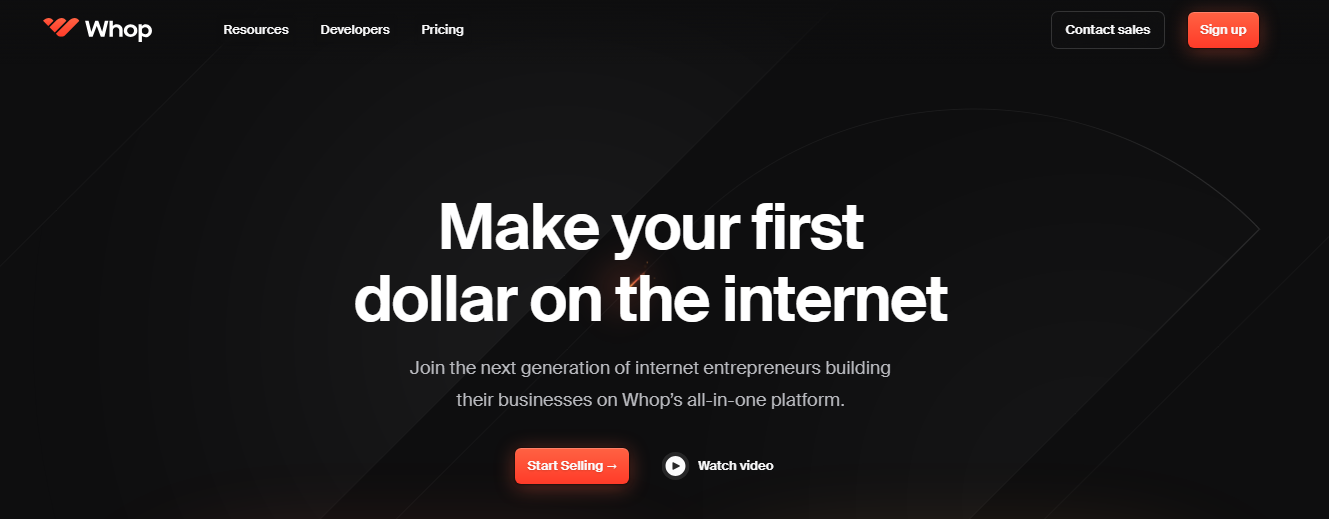
Etsy is known as the go-to platform for selling handmade and crafted goods, and it has also become home to many artists selling their digital products too. However, while it may be a good place to start thanks to it's established user base, Etsy does not give you all the tools you need to successful sell digital products online.
Thankfully, there is another option - Whop. Whop has much lower fees, specialized tools, and a less crowded market, which makes it better for anyone selling digital art, PDFs, craft, and more.
Whop can also help you to grow your business. While on Etsy you can simply sell products, with Whop you can create a whole online business, with courses, communities, ebooks, and more. You simply create your own whop (your online hub), bundle your items, and start selling.
Whop is home to many successful creators selling their handmade digital goods online - why not join them?
Etsy Frequently Asked Questions
Below are some common Etsy seller FAQs you should know:
Who is Etsy's Biggest Competitor?
Amazon Handmade may likely be Etsy's biggest competitor as it's one of the largest ecommerce platforms, with more than $300,000 billion in annual sales. While it's entirely possible to succeed selling at Etsy or Amazon Handmade, we recommend trying other platforms especially when you haven't established your brand in the market yet, or if you want to sell items quickly.
Can You Only Sell Handmade Products On Etsy?
While Etsy is known as an ecommerce store that sells vintage and handmade items, sellers can also sell digital items on Etsy. If you work with a partner, it's a must to disclose it in your listings. Some sellers may need a partner especially when they don't have the equipment or if their business is growing. Read Etsy's Handmade policy to get more information regarding this.




